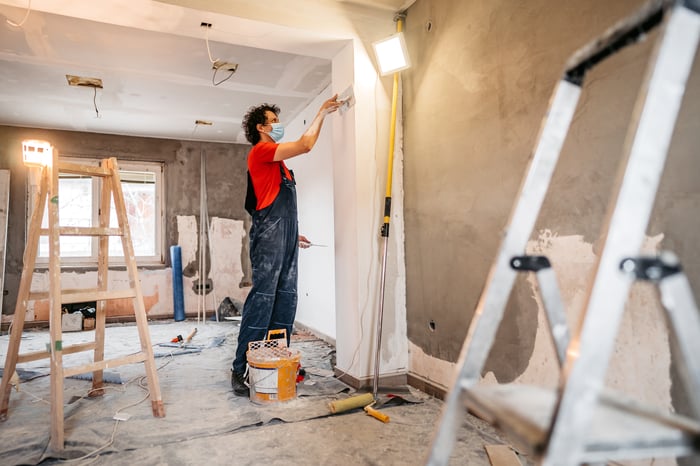Flipping houses is a great way to make money as a real estate investor. But it's by no means an easy thing to do.
Even if you're a relatively handy person and can tackle a lot of physical labor yourself, there's still a world of risk you'll take on in the course of fixing up a home in the hopes of selling it at a much higher price. This especially holds true if you don't have much experience in the world of house flipping.
In fact, here are a few rookie mistakes you should do your best to avoid.

Image source: Getty Images.
1. Paying too high a purchase price
Usually, homes in disarray can be purchased at a discount. But still, it's important to make sure you're not overpaying for a home to flip, even if its listing price is well below that of other homes in the same area in better shape.
As a general rule, you shouldn't spend more than 70% of your estimated post-repair value when buying a house to flip. And that 70% includes your renovation costs. So if you think a given home will be worth $300,000 once you're done flipping it and estimate it will cost you $50,000 to renovate it, you shouldn't spend more than $160,000 to buy it ($50,000 + $160,000 = $210,000, which is 70% of $300,000).
2. Underestimating your renovation costs
You might assume you can renovate a home on the relative cheap, especially if you're able to do much of the work yourself. But remember, the cost of building materials is up these days due to supply chain issues and general inflation. And so now more so than ever, it's important to research your renovation costs carefully before landing on that number.
3. Over-improving a home
The point of flipping a home is to get it into better shape so that it appeals to buyers. But there is such a thing as improving a home to the point where it's too high end for its local market.
Imagine you're flipping a home in a modest neighborhood where most properties have some upgrades, but not many. If you sink thousands upon thousands of dollars into a high-end kitchen and bathrooms with ultra-expensive features, that home is going to stick out -- but not necessarily in a good way.
Often, buyers will be hesitant to buy the most expensive home in the neighborhood. And so if you turn a home into a $300,000 property due to making numerous updates but the average home in the area is only worth $250,000, you may not find a buyer -- or at least one who's willing to pay your asking price.
Proceed with caution
Flipping houses can be a lucrative prospect for real estate investors. But it can also lead to serious losses. If you're going to enter the house-flipping space, research different markets carefully and price out renovation costs meticulously so you don't end up overspending and overpricing the property you're fixing up.
In fact, if you're new to house flipping, you may want to team up with an experienced flipper for your first property so you can learn the ropes and avoid some of the stumbling blocks you might otherwise face. And that way, you'll also have someone to share some of the risk inherent in house flipping with.






